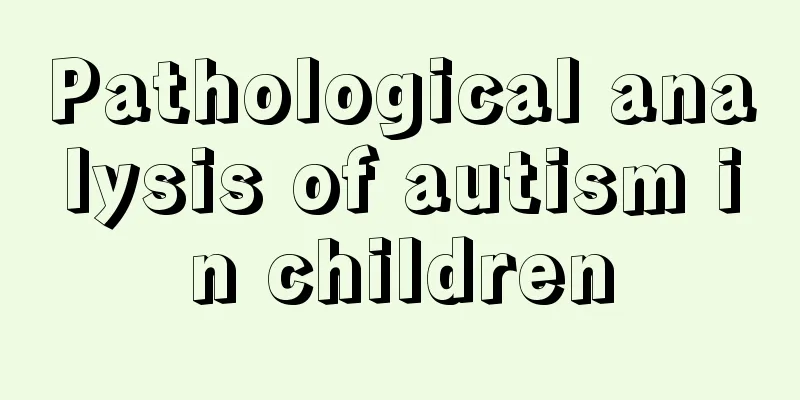What to do if your 2-year-old baby gets angry

|
When talking about the word "getting angry", many people think that this is a phenomenon that only occurs in adults. In fact, babies can also get angry. When a 2-year-old baby gets angry, he will show symptoms such as not wanting to sleep, eye mucus, yellow urine, dry stool, etc. At this time, the mother should adjust the baby's diet and lifestyle habits in time to effectively relieve the baby's getting angry. What to do if your 2-year-old baby gets angry Pay attention to your daily diet. Eat a light, nutritious diet, eat more fruits, and eat some hot foods in moderation. Mothers should also pay more attention to their baby's diet, such as eating more heat-clearing vegetables, such as cabbage, celery, lettuce, eggplant, etc. Avoid spicy, greasy, high-calorie foods, and be careful to let your baby eat less spicy foods such as onions, chili peppers, peppers; and high-calorie foods such as meat, chocolate, and fried foods. When cooking, we can pay attention to the nutritional combination, which is a win-win situation for babies. You can also make some heat-reducing soups, such as mung bean soup. Fruits are not only rich in nutrients but also can aid digestion. Letting children eat more fruits regularly, especially seasonal fruits, is beneficial to the baby's growth and development. You can also use fruits to make delicious fruit salads to attract children to eat. Cultivate the habit of drinking boiled water for your baby. It replenishes the water needed by the baby's body, and also cleans the intestines, eliminates waste, etc. If your baby doesn’t like drinking plain water, you can add some sugar or fruit juice. Maintain a reasonable daily routine. In daily life, you must ensure that your baby gets enough sleep. Insufficient sleep or poor sleep quality will cause getting a sore throat. Keep the indoor environment fresh Keep your baby in a happy mood. You should also consider the combination of work and rest, and never let your baby become overly tired. Symptoms of baby getting angry 1. Dry stool Symptoms: Dry and hard stools, small amounts of hard, granular stools, and bowel movements occur every 3-5 days. The defecation process is prolonged or difficult, and the baby cries and makes a fuss due to pain in the anus caused by irritation from dry feces. Hazards: Babies suffering from constipation often form a vicious cycle. Constipation will reduce immunity and make the baby vulnerable to external viruses. Long-term poor bowel movements can cause habitual constipation. 2. Yellow urine Symptoms: Your baby's urine is yellower than usual and less in volume. Hazards: Long-term short and yellow urine means that the baby's body is often dehydrated, and normal physiological activities and physical development will inevitably be affected. 3. Mouth and tongue ulcers Symptoms: Babies who cannot speak often refuse to eat, are easily irritated, cry and even refuse to drink water. Some babies will touch their mouths with their hands from time to time. Harm: Mouth and tongue ulcers can cause babies to refuse to eat, become irritable, and even unwilling to drink water, resulting in insufficient normal nutrition for the baby and affecting physical development. If you are not careful, it is easy to cause angular cheilitis, also known as "sore corners of the mouth." 4. Poor sleep Symptoms: Babies often become irritable, restless, cry, wake up easily, turn over and over, and sometimes grind their teeth while sleeping. Harm: Poor sleep leads to a disrupted daily routine, and makes the baby prone to anger, mental irritability, impatience, mood swings, etc., which further aggravates the baby's problem of getting angry. This will eventually lead to consequences such as poor development and decreased resistance, affecting the baby's normal physical and mental development. 5. Increased eye mucus Symptoms: Some babies will experience increased eye secretions, especially in the morning when they wake up, there will be eye mucus in the corners of the eyes, and if there is too much, it will stick to the eyelids. Hazard: It is easy to cause bacteria invasion and cause sty. Stye, commonly known as pinhole, is a common eye disease in babies. 6. Have a bad breath Symptoms: Bad breath is not an independent disease, but a warning signal sent by the body. Hazards: Bad breath will affect your daily life experience, and when stomach fire is severe, problems such as dry stools will occur simultaneously, forming a vicious cycle of getting angry. |
<<: What to do when your 2-year-old baby is in the rebellious period
>>: What to do if your 2-year-old baby catches a cold and vomits
Recommend
Baby's esotropia
Nowadays, many children may develop myopia becaus...
What should I do if my baby has a runny nose and tears? These methods are very useful
If the baby has a runny nose and tears, parents n...
How to treat night terrors in children
Some places in our country are very superstitious...
What's wrong with the child's sudden headache?
Adults often suffer from headaches because they a...
Symptoms of early development in little girls
For parents, their children's health is the m...
How to relieve the baby's poop for two days
Parents are very concerned about their children&#...
Causes of indigestion and vomiting in children
Today, the editor will explain to you in detail t...
Should the legs of a newborn be bound?
We all know that many children’s legs will be tie...
What to do if a child has a fever and diarrhea
Young children have low immunity and produce fewe...
The baby suddenly has leg pain and can't walk
Many babies have leg pain in their lives, but aft...
What causes children to have a high fever and vomit?
All parents should pay great attention to their c...
Child with high fever and foaming at the mouth
Fever is a very common disease in children. Howev...
How to correct the uneven back of the baby's head
Some parents may find that the back of their baby...
What should I do if my child has folliculitis?
The main cause of folliculitis is bacterial infec...
Reasons for darkening of newborn skin
Generally speaking, it is normal for a newborn to...









